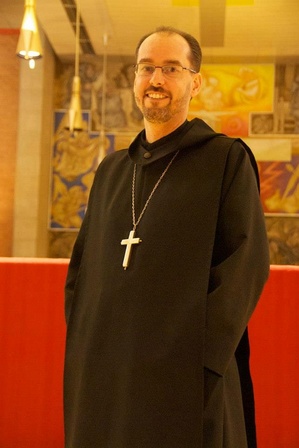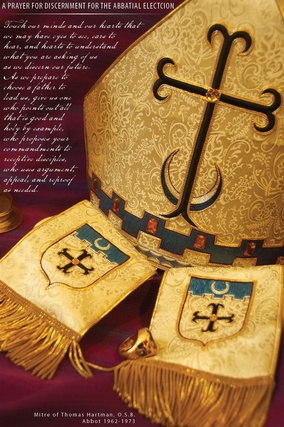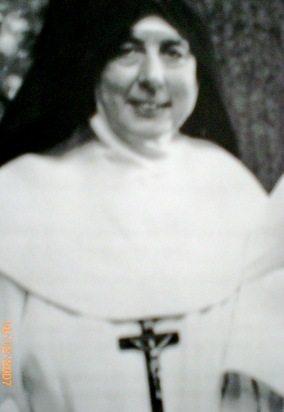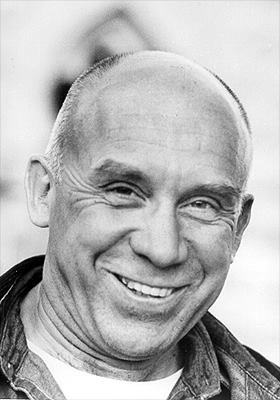 The monastic chapter of Saint Benedict's Abbey (Atchison, KS) elected Father James Robert Albers, 41 as the 9th abbot earlier today. Until now, he's served the monastic community as the Prior and vocation director.
The monastic chapter of Saint Benedict's Abbey (Atchison, KS) elected Father James Robert Albers, 41 as the 9th abbot earlier today. Until now, he's served the monastic community as the Prior and vocation director.Benedictines: December 2012 Archives
 The monastic chapter of Saint Benedict's Abbey (Atchison, KS) elected Father James Robert Albers, 41 as the 9th abbot earlier today. Until now, he's served the monastic community as the Prior and vocation director.
The monastic chapter of Saint Benedict's Abbey (Atchison, KS) elected Father James Robert Albers, 41 as the 9th abbot earlier today. Until now, he's served the monastic community as the Prior and vocation director. Later today the monks of Saint Benedict's Abbey
(Atchison, KS) enter into a special chapter (the group of solemnly processed)
to begin the process of electing a new Abbot.
Later today the monks of Saint Benedict's Abbey
(Atchison, KS) enter into a special chapter (the group of solemnly processed)
to begin the process of electing a new Abbot. Today marks the 29th anniversary of death of Mother Marie des Douleurs, known in history as Suzanne Wrotnowska (1902-1983), the foundress of the Congregation of Benedictines of Jesus Crucified. A true spiritual mother of all who need mercy, especially women who would not be able to enter the monastic life due physical impediments. Mother Marie's spiritual maternity extended also to priests who haven't repented of their sin.
Today marks the 29th anniversary of death of Mother Marie des Douleurs, known in history as Suzanne Wrotnowska (1902-1983), the foundress of the Congregation of Benedictines of Jesus Crucified. A true spiritual mother of all who need mercy, especially women who would not be able to enter the monastic life due physical impediments. Mother Marie's spiritual maternity extended also to priests who haven't repented of their sin.In the eventide of my life, I have such a need of recollection, such a need to obey and to humble myself. I am unworthy of having been chosen to found the Congregation. I suffer being pulled between heaven and earth. The cross grows heavy. The Lord gave me as my portion the souls of guilty priests...my own soul disappears beneath an accumulation of iniquities! But I had asked for this humiliation! How is that the Lord was able to make use of so little a thing? His fidelity, His consuming love, this all my life, my light my death.

Hear with favor our prayers, which we humbly offer, O Lord, for the salvation of the soul of Father Louis (Thomas Merton), your servant and Priest, that he, who devoted a faithful ministry to your name, may rejoice in the perpetual company of your Saints.
The famous Trappist monk, Thomas Merton (b. 1915) died on this date in 1968.
In very many ways Merton was a consummate human being: loved pleasure and engaged his freedom only to transform pleasure and his version of freedom with his embrace a life of prayer and silence as a Strict Obsernace Cistercian (a Trappist monk) in a Kentucky abbey. In the monastery Thomas Merton was known as Father M. Louis, a name I still prefer to use because of his commitment to the monastic life. At the command of his abbot, Merton wrote of his conversion in his 1949 best seller, The Seven Storey Mountain, introducing millions of people to the monastic life. No other book since this one has had such a critical impact on Catholics.
His conversion story was only one of many books and essays published by Merton and even in death Merton continues to publish due to the finding of new materials or the repackaging of thought into new books. The irony of Merton's life as a monk is that he died in Asia conferencing with an international and interfaith group of monks and nuns. His body was brought home in a steel casket on a military transport.



